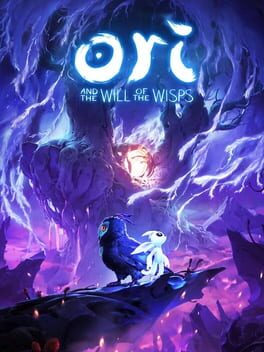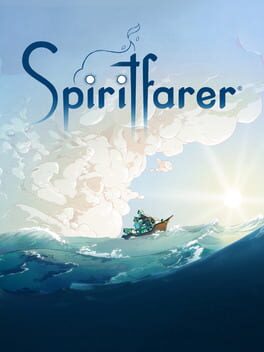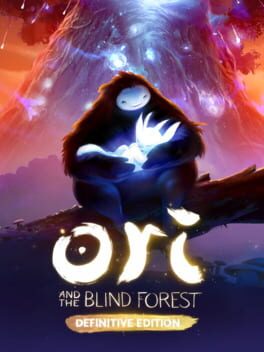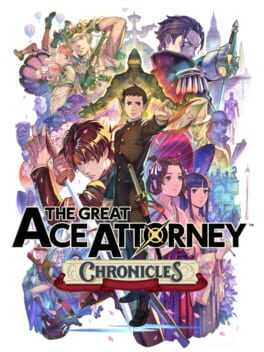ashofines
5 reviews liked by ashofines
Spiritfarer
2020
Ori is one of the cutest, thrilling, hardest, most emotional, satisfying, saddest, most beautiful, varied, inventive, imaginative and funniest platformer that I've ever played, and it comes with both, a perfect visual art style, and a perfect music score, which makes it so much more fun to play. For a platformer it comes with so many interesting features you wouldn't expect, like small puzzle games to advance, or even a leveling system so that you can upgrade your character individually (at least to a degree) to meet your personal play style. And it's - in a way even an open world game - sure, there are parts you cannot reach due to a lack of certain abilities (yet), but you are free to move and sometimes there are two or more choices that are open to you. And then there are end bosses - each with their unique play style that you need to adapt to, to being able to defeat him, using all the abilities in your repertoire.
All in all, it's just a really wonderful experience, and a game that I am actually really excited to revisit soon. With [for me] 17 hours to play it's also a rather compact game that you can squeeze in-between bigger games (like for me RDR2 and RDR :D ), but it feels like the prefect size (as the game is of course getting more and more challenging with every bit of progress, and in the end you'll be restarting a couple of times to master a certain sequence or end boss).
All in all, it's just a really wonderful experience, and a game that I am actually really excited to revisit soon. With [for me] 17 hours to play it's also a rather compact game that you can squeeze in-between bigger games (like for me RDR2 and RDR :D ), but it feels like the prefect size (as the game is of course getting more and more challenging with every bit of progress, and in the end you'll be restarting a couple of times to master a certain sequence or end boss).
Disco Elysium
2019
Wow, what a genuine masterpiece! DnD, True Detective, The Wire, Jenny Saville, Alex Kanevsky, Wassily Kandinsky and all political ideologies rolled into one and you got Disco Elysium. I will most likely be preaching to the choir, but yeah this is a universally beloved game for a good reason. Firstly, this is just a brilliantly written game. The writing is fantastic from all perspectives, and the intricate worldbuilding feels so immersive and lived in. The various political ideologies, you can follow whether being a communist, fascist, ultra-liberal or moralist (etc..), the decisions that you make will increase those stats. Which can honestly be a reflection of your own moral compass and of course wanting to game the system. The characters feel so genuine and realistic maybe to an uncomfortable degree. Loss, depression, isolation, and mental illness there are so many subject matters explored within the protagonist’s psychology. I glanced at the Disco Elysium Wikipedia, and I was surprised how much I missed his backstory which is unlocked through the “Thought Cabinet”. It’s part of the genius of the game, it can offer insight into your life before the case, as well as stat bonuses and other minor gameplay differences. There are also unique thoughts that convey unique effects, some aspects I assumed I should have unlocked to get through some secrets.
Genuinely the writing is just one piece of the pie of what makes this game fantastic. As I described above the Thought Cabinet, the increasing of certain stats and the DnD-inspired nature also make it a fun game to play in general. It isn’t just brilliantly written but it’s interwoven with intricate game mechanics that it becomes a story that can only be told through its medium. Every player will play the same main missions but how you accomplish those missions can vary from person to person. There’s a decent chunk of missable content, however, if you just play the game, interact with the people and interact with different you should be able to find most things very easily. The side quests aren’t required but why miss them? It’s brilliantly written, has a lot of amazing worldbuilding and you will be surprised some could connect to the main storyline in intriguing ways. There are so many small details it got right, like the novels that you interact with to pass time, they can be a ton of fun.
Kim Kitsuragi is one of the big reasons why this game works so well. His interaction with the protagonist is so brilliant and both have an amazing back-and-forth. You genuinely want to earn his respect and how that bond develops throughout the game is brilliant. There’s underlying compassion beyond cynicism, nihilistic undertones and depression of the world and its inhabitants which was highlighted beautifully. The music I felt fit the tone of the game, and I adored it. The art design makes this come to life. The graphics are fine, but the artsy involved is what makes this so immersive and engrossing. All the clogs click into place for this experience the gameplay, music, story, art design and not even talking about the UI. It’s accessible enough for the general gamer but also has enough depth to continuously play this after the first playthrough. The ending was fitting (I should note I got the good ending) and I’m sad we will never get a sequel, but as a standalone game, I 100% recommend Disco Elysium, it’s one of those rare masterpieces in this medium.
Genuinely the writing is just one piece of the pie of what makes this game fantastic. As I described above the Thought Cabinet, the increasing of certain stats and the DnD-inspired nature also make it a fun game to play in general. It isn’t just brilliantly written but it’s interwoven with intricate game mechanics that it becomes a story that can only be told through its medium. Every player will play the same main missions but how you accomplish those missions can vary from person to person. There’s a decent chunk of missable content, however, if you just play the game, interact with the people and interact with different you should be able to find most things very easily. The side quests aren’t required but why miss them? It’s brilliantly written, has a lot of amazing worldbuilding and you will be surprised some could connect to the main storyline in intriguing ways. There are so many small details it got right, like the novels that you interact with to pass time, they can be a ton of fun.
Kim Kitsuragi is one of the big reasons why this game works so well. His interaction with the protagonist is so brilliant and both have an amazing back-and-forth. You genuinely want to earn his respect and how that bond develops throughout the game is brilliant. There’s underlying compassion beyond cynicism, nihilistic undertones and depression of the world and its inhabitants which was highlighted beautifully. The music I felt fit the tone of the game, and I adored it. The art design makes this come to life. The graphics are fine, but the artsy involved is what makes this so immersive and engrossing. All the clogs click into place for this experience the gameplay, music, story, art design and not even talking about the UI. It’s accessible enough for the general gamer but also has enough depth to continuously play this after the first playthrough. The ending was fitting (I should note I got the good ending) and I’m sad we will never get a sequel, but as a standalone game, I 100% recommend Disco Elysium, it’s one of those rare masterpieces in this medium.
This review contains spoilers
I can see why for some or even many people this is peak Ace Attorney, and I acknowledge I've only played the original trilogy so I don't appreciate the full scope of the series. Certainly many issues people have had with previous games get ironed out: case quality is more consistent and are more intimately connected, it shifts time periods to skirt the series's baggage, etc. There's a great deal to admire here, and it's undeniable these function more as one collective game (albeit one that partway through decides to reteach you its basic mechanics) than two distinct games.
I just...like the first part of this game noticeably more and wish the second part was noticeably different.
Great Departure--the first case of Adventures--is a beautiful Swiss watch of an intro, both in the first playthrough and in its repercussions on the rest of the game. Speckled Band is the barnburning debut of Sholmes and brings in the investigation side of the game. It's a fairly standard one-two punch for Ace Attorney in terms of structure and plot beats, but it's reliable and has just enough new flavour to feel fresh. Runaway Room caught me off guard because you genuinely can't get a clear read on the defendant until late in the trial. McGilded is no obvious innocent like Larry or Maggey, nor is his dark side as unforgivable as Matt Engarde. His interference with evidence (which had me double-guessing myself) and murder post-trial elevates the mystery and the sense of moral grayness Ace Attorney's first three games largely avoid. Clouded Kokoro is the weak link of Adventures, but still a charming and satisfying case, providing a thoughtful look into the discrimination Ryunosuke et al experience (as an aside: GAAC is surprisingly thoughtful in its dealings with historical subjects but I don't want to delve into where I think it falls short, as it's frankly not aspiring to much in that regard). Unspeakable Story is slow to gear up but is an excellent conclusion once it hits its stride, knitting together everything but leaving enough intrigue to build the foundation for Resolve. It also has the Skulkin Brothers who are perfect ok they're perfect video game characters and I loved every single thing about them and if you don't think that too then I can't tell you anything about anything. This is the closest any of the sequels has come to meeting my enjoyment of the original Ace Attorney.
But it also felt more tightly wound than the original. There seemed to be a lot fewer times where showing someone a non-critical piece of evidence would still yield an original comment or joke. There were almost no times where I was genuinely stumped by a problem, either in a pleasant or frustrating way, as things tended to be blatantly telegraphed and only the fourth and fifth cases really engaged every mechanic. It struck me as redundant to have finally made the "we'll play it for you" mode in a game that offered so little off the beaten path and so clearly signposted the main path. All of this restrictiveness is even more pronounced in Resolve.
For me, Resolve is the standard Ace Attorney mechanical structure grafted onto a story trying to outgrow the limits that structure imposes. The intro case is solid and expands the scope of the conspiracy the game will center on, but gets somewhat bogged down by it having to be a first case where you're only in a courtroom and the basics need to be explained again (it's the sequel to a prequel to a 6-game series with multiple spin-offs, this is no one's first rodeo). Clouded Kokoro 2 oddly jumps back in time for a case that barely figures into the core plot and dampens the tension raised by the end of Adventures and the intro; honestly it felt like they didn't know how to either stretch the conspiracy across three distinct cases or dive right into things and have each case be a bit more substantial. Great Departed Soul is where the tension boils over: it becomes clear we are tackling an international decade-spanning criminal conspiracy and yet we are stuck on a narrow footpath where there's like twenty things wrong with what the defendant is saying but you need to think "a-ha, they said they birdcage fell headfirst when it actually fell feet-first!" to progress (yes I was playing this section on a plane and so couldn't look up the solution and I was brute forcing through every statement and I'm salty about it). The telegram and the collar can't be referenced until the game decides you can, you can't ask anyone about the conspiracy generally or indirectly through evidence and get a unique response (as far as I know), you can't bring up things people said previously in other cases or other sections of this case, and in the final two-part case you can't lay out the web before you as a whole.
The best way I can explain the experience is sometimes Ace Attorney feels like it's dropped a dense knot at your feet and asked you to untie it; other times it feels like you've got a circuitous series of hanging vines before you and it's just a matter of swinging from one to the next, ending up somewhere you feel like you could have gotten to quicker if you were in charge of where to go. My personal preference is the former, and I found it frustrating as the original trilogy skewed more towards the latter as it progressed. I'd compare it to Zelda dungeons, where Ocarina's and Majora's are denser and require global thinking whereas Wind Waker and Twilight Princess are more linear and don't have you thinking much beyond the room you're in at the time. Neither is "the Real Ace Attorney/Zelda", I'm just always gonna be endeared more to one style and at best be merely pleased by the other.
It's fair to say at this point that I am unreasonably criticizing an Ace Attorney game for failing to be something it's not: something closer to maybe Obra Dinn (which I like less than my favourite AA games) or Disco Elysium (which I like more than every AA game). It's fair to say that the conclusion was still satisfying and kept me on my toes and was an achievement of fusing music, animation, dialogue, twists and humour in a way seemingly only Ace Attorney can. It's fair to say this more straightforward, "swinging from vine to vine" style of puzzle solving is maybe what more people want over a more "untangling a knot of wires" style. And of course it's fair to say that when Mikotoba did his little tap dance I completely forgot how annoyed I was previously at the reveal that he was Sholmes's partner not seeming to merit the gravity the game heaped on it.
But in a way finishing GAAC has made me less interested in going further with the series. Do I want to play three games that are by most accounts worse than almost all of the five I've already played? Do I want to sit through another final case that drags and has two or three more twists than it needs to either delay getting to the thing that makes the most sense or zag into a weirder ending? Do I want to watch the relative simplicity of the original trilogy be weighed down with more stories centering a cast who have basically all completed their respective narrative journeys? I don't know. This is a brilliant package and I feel like a spoiled kid for harping on it not being exactly what I want. But I think it's fair to want an experience as novel as that first game felt, and to set the series aside until that comes around.
I just...like the first part of this game noticeably more and wish the second part was noticeably different.
Great Departure--the first case of Adventures--is a beautiful Swiss watch of an intro, both in the first playthrough and in its repercussions on the rest of the game. Speckled Band is the barnburning debut of Sholmes and brings in the investigation side of the game. It's a fairly standard one-two punch for Ace Attorney in terms of structure and plot beats, but it's reliable and has just enough new flavour to feel fresh. Runaway Room caught me off guard because you genuinely can't get a clear read on the defendant until late in the trial. McGilded is no obvious innocent like Larry or Maggey, nor is his dark side as unforgivable as Matt Engarde. His interference with evidence (which had me double-guessing myself) and murder post-trial elevates the mystery and the sense of moral grayness Ace Attorney's first three games largely avoid. Clouded Kokoro is the weak link of Adventures, but still a charming and satisfying case, providing a thoughtful look into the discrimination Ryunosuke et al experience (as an aside: GAAC is surprisingly thoughtful in its dealings with historical subjects but I don't want to delve into where I think it falls short, as it's frankly not aspiring to much in that regard). Unspeakable Story is slow to gear up but is an excellent conclusion once it hits its stride, knitting together everything but leaving enough intrigue to build the foundation for Resolve. It also has the Skulkin Brothers who are perfect ok they're perfect video game characters and I loved every single thing about them and if you don't think that too then I can't tell you anything about anything. This is the closest any of the sequels has come to meeting my enjoyment of the original Ace Attorney.
But it also felt more tightly wound than the original. There seemed to be a lot fewer times where showing someone a non-critical piece of evidence would still yield an original comment or joke. There were almost no times where I was genuinely stumped by a problem, either in a pleasant or frustrating way, as things tended to be blatantly telegraphed and only the fourth and fifth cases really engaged every mechanic. It struck me as redundant to have finally made the "we'll play it for you" mode in a game that offered so little off the beaten path and so clearly signposted the main path. All of this restrictiveness is even more pronounced in Resolve.
For me, Resolve is the standard Ace Attorney mechanical structure grafted onto a story trying to outgrow the limits that structure imposes. The intro case is solid and expands the scope of the conspiracy the game will center on, but gets somewhat bogged down by it having to be a first case where you're only in a courtroom and the basics need to be explained again (it's the sequel to a prequel to a 6-game series with multiple spin-offs, this is no one's first rodeo). Clouded Kokoro 2 oddly jumps back in time for a case that barely figures into the core plot and dampens the tension raised by the end of Adventures and the intro; honestly it felt like they didn't know how to either stretch the conspiracy across three distinct cases or dive right into things and have each case be a bit more substantial. Great Departed Soul is where the tension boils over: it becomes clear we are tackling an international decade-spanning criminal conspiracy and yet we are stuck on a narrow footpath where there's like twenty things wrong with what the defendant is saying but you need to think "a-ha, they said they birdcage fell headfirst when it actually fell feet-first!" to progress (yes I was playing this section on a plane and so couldn't look up the solution and I was brute forcing through every statement and I'm salty about it). The telegram and the collar can't be referenced until the game decides you can, you can't ask anyone about the conspiracy generally or indirectly through evidence and get a unique response (as far as I know), you can't bring up things people said previously in other cases or other sections of this case, and in the final two-part case you can't lay out the web before you as a whole.
The best way I can explain the experience is sometimes Ace Attorney feels like it's dropped a dense knot at your feet and asked you to untie it; other times it feels like you've got a circuitous series of hanging vines before you and it's just a matter of swinging from one to the next, ending up somewhere you feel like you could have gotten to quicker if you were in charge of where to go. My personal preference is the former, and I found it frustrating as the original trilogy skewed more towards the latter as it progressed. I'd compare it to Zelda dungeons, where Ocarina's and Majora's are denser and require global thinking whereas Wind Waker and Twilight Princess are more linear and don't have you thinking much beyond the room you're in at the time. Neither is "the Real Ace Attorney/Zelda", I'm just always gonna be endeared more to one style and at best be merely pleased by the other.
It's fair to say at this point that I am unreasonably criticizing an Ace Attorney game for failing to be something it's not: something closer to maybe Obra Dinn (which I like less than my favourite AA games) or Disco Elysium (which I like more than every AA game). It's fair to say that the conclusion was still satisfying and kept me on my toes and was an achievement of fusing music, animation, dialogue, twists and humour in a way seemingly only Ace Attorney can. It's fair to say this more straightforward, "swinging from vine to vine" style of puzzle solving is maybe what more people want over a more "untangling a knot of wires" style. And of course it's fair to say that when Mikotoba did his little tap dance I completely forgot how annoyed I was previously at the reveal that he was Sholmes's partner not seeming to merit the gravity the game heaped on it.
But in a way finishing GAAC has made me less interested in going further with the series. Do I want to play three games that are by most accounts worse than almost all of the five I've already played? Do I want to sit through another final case that drags and has two or three more twists than it needs to either delay getting to the thing that makes the most sense or zag into a weirder ending? Do I want to watch the relative simplicity of the original trilogy be weighed down with more stories centering a cast who have basically all completed their respective narrative journeys? I don't know. This is a brilliant package and I feel like a spoiled kid for harping on it not being exactly what I want. But I think it's fair to want an experience as novel as that first game felt, and to set the series aside until that comes around.




